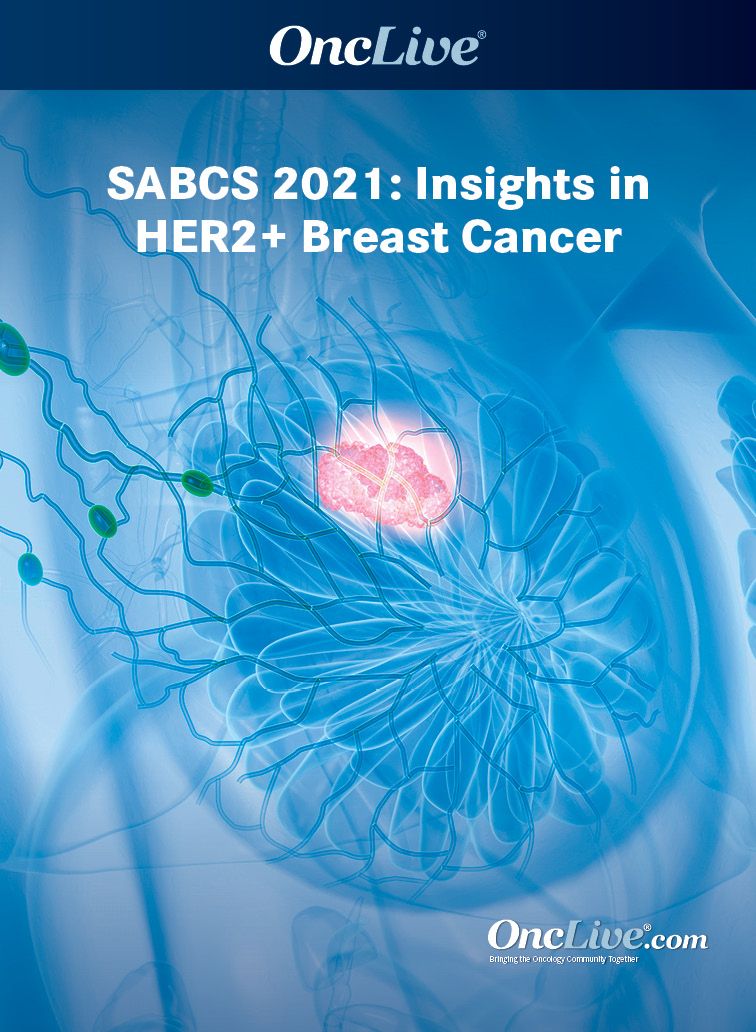Dr. Fernandez on the Need to Refine Immunohistochemistry Testing in HER2+ Breast Cancer
Aileen I. Fernandez, PhD, discusses the need to refine immunohistochemistry testing in HER2-positive breast cancer.
EP: 1.Yale Cancer Center Merges Cutting Edge Research with Personalized Medicine
EP: 2.Dr. Decker on Pembrolizumab With Concurrent Chemoradiotherapy in Inoperable Locally Advanced NSCLC
EP: 3.Dr. Anees Chagpar Named 2021 ASCO Fellow
EP: 4.Yale Cancer Center’s Dr. Lieping Chen Elected to Prestigious National Academy of Sciences
EP: 5.Yale Research to be Presented at 2021 ASCO Annual Meeting
EP: 6.Dr. Bewersdorf on the Role of Allogeneic Transplant in Myelofibrosis
EP: 7.Barbara Burtness Named Interim Associate Director for Diversity, Equity, and Inclusion at Yale Cancer Center
EP: 8.Joseph W. Kim Receives Prestigious 2021 Cancer Clinical Investigator Team Leadership Award
EP: 9.Yale Cancer Center Perspective Highlights New Advances for NSCLC
EP: 10.Yale Cancer Center Study Shows Stem-Like T Cells Could Aid Immunotherapy in Cancer Treatment
EP: 11.Dr. Silber on the Importance of Improving Clinical Trial Inclusivity in Breast Cancer
EP: 12.Dr. Lustberg Discusses Ongoing Research in Breast Cancer
EP: 13.Margaret Gilshannon named Deputy Director for Finance & Administration at Yale Cancer Center
EP: 14.Tissue Mapping Center for Cellular Senescence Launched at Yale Cancer Center to Study Human Lymphoid Organs
EP: 15.Institutional Perspectives in Cancer- Women’s Cancers: Chaired by Elena Ratner, MD
EP: 16.Eric P. Winer to lead Yale Cancer Center and Smilow Cancer Hospital
EP: 17.Dr. Parker Discusses the Importance of Optimizing Treatment in Multiple Myeloma
EP: 18.Yale Cancer Center Study Shows New Strategy to Boost Immune System to Fight Melanoma
EP: 19.Dr. Fernandez on the Need to Refine Immunohistochemistry Testing in HER2+ Breast Cancer
EP: 20.Dr. Fernandez on the Utility of Trastuzumab Deruxtecan in HER2-Low Breast Cancer
EP: 21.Immunotherapy Advances Drive Progress in Lung Cancer Treatment
EP: 22.Ian E. Krop, MD, PhD, Named Chief Clinical Research Officer, Associate Cancer Center Director for Clinical Research at Yale Cancer Center
EP: 23.Yale Cancer Center Study Reveals Disparities in Telemedicine Use in Patients with Hematologic Cancers
EP: 24.Addition of Bevacizumab to Ixabepilone Is Effective, Tolerable in Platinum-Resistant Ovarian Cancer
EP: 25.Dr. Petrylak on the Rationale of the EV-103 Trial in MIBC
EP: 26.Yale Cancer Center and School of Public Health Receive Grant to Study Lifestyle Intervention in Women with Ovarian Cancer
EP: 27.Berzosertib Plus Standard Chemoradiation Elicits Promising Responses in Locally Advanced HNSCC
EP: 28.Barbara Burtness Named Chief Translational Research Officer for Yale Cancer Center and Smilow Cancer Hospital
EP: 29.Expert Insights on First-line Treatment Strategies in SCLC
EP: 30.Combination Therapy Approaches With Chemotherapy and Immunotherapy in ES-SCLC
EP: 31.ADRIATIC Trial and Investigational Treatment Approaches for Limited-Stage SCLC
EP: 32.Patient Scenario 2: 1L Management of ES-SCLC Positive for Synaptophysin With a Ki-67 Score of 90%
EP: 33.Real World Data for Combination Strategies With Chemotherapy and Immunotherapy in ES-SCLC
EP: 34.Patient Scenario 3: 2L Lurbinectedin Following 1L Combination IO Chemotherapy
EP: 35.Evolving Treatment Strategies for SCLC in the Second-Line Setting and Beyond
EP: 36.LAGOON and IMFORTE Trials: Data Updates and Expert Insights
EP: 37.2L Dosing Considerations and Management Strategies for SCLC
EP: 38.Novel Treatment Approaches for SCLC and Future Perspectives
Aileen I. Fernandez, PhD, postdoctoral fellow, Yale School of Medicine, discusses the need to refine immunohistochemistry (IHC) testing in HER2-positive breast cancer.
Findings from a study evaluating low HER2 expression in patients with breast cancer underscored a discrepancy between the frequency clinicians agreed upon immunohistochemistry (IHC) results of 0 vs 1+ or 2+ vs 3+. Clinicians were more likely to agree upon diagnoses of IHC 2+ or 3+ compared with 0 or 1+.
These findings indicate that IHC testing results should be analyzed carefully, Fernandez explains. Historically, IHC 2+ or 3+ results were focused on because they informed treatment selection with trastuzumab (Herceptin). However, as scoring accuracy is imperfect, misassignment remains a risk, Fernandez explain.
Developing a new test, answering preanalytical questions, and standardizing testing across the board would be helpful, Fernandez says. Moreover, in reading IHC test results, differences with the machines and the clinicians interpreting the results may provide insight as to why there remains disagreement in IHC analysis.
Moreover, as the field of breast cancer continues to evolve, other therapies targeted toward biomarkers beyond HER2 will emerge, further underscoring the need for improved testing, concludes Fernandez.




